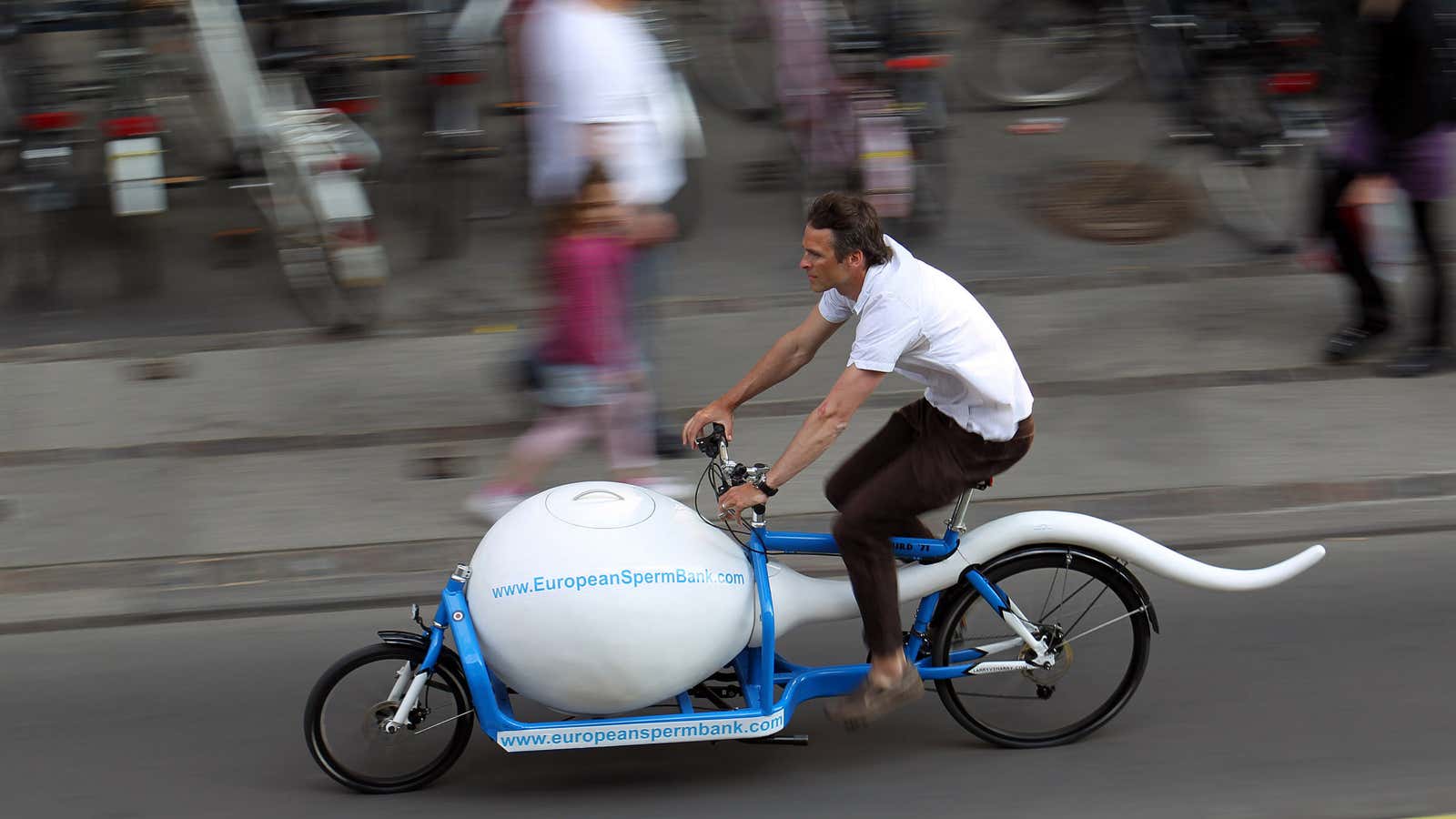“Women, consider freezing your eggs,” blared a recent headline on CNN’s website. In the piece, Yale anthropology professor Maria C. Inhorn advises women that freezing their eggs before they turn 30 will enable them to eventually “rewind the biological clock,” giving them more room to choose when they have children, instead of feeling forced to give birth before the inevitable fertility decline. Those are all valid arguments, but if you agree with Inhorn, then you shouldn’t limit yourself to solely advocating for egg cryopreservation (freezing)—you should be telling men to freeze their sperm, too.
Woman are born with a set number of eggs in their ovaries. From puberty onward, women dispense them until the reproductive potential of these eggs runs out, usually in their 50s. Men, however, produce sperm continually. But that doesn’t mean that their gametes—reproductive cells that fuse with another cell to reproduce—remain sprightly throughout their lives.
Much like women’s eggs, the quality of a man’s sperm significantly decreases with age. This occurs because the machinery that allows men to produce sperm ages too, which can introduce mutations, or errors, in DNA. For instance, older men are more likely to have children that will develop schizophrenia or autism than their younger counterparts. And fathers pass on nearly four times more new genetic mutations than mothers, according to a study published in Nature, an international journal of science, in 2012. In short, the age of the mother isn’t the only factor to think about if you’re fighting against the ticking of the biological clock.
In fall of 2012, the American Society for Reproductive Medicine removed the “experimental” label from egg freezing. While it may help cancer patients improve their chances of becoming pregnant down the line, it’s not necessarily the case for women simply electing to delay reproduction, according to the Associated Press.
“The bottom line is there is no guarantee,” said Dr. Samantha Pfeifer of the University of Pennsylvania, who chaired the society’s guideline committee. “A lot of women interested in using this technology are in their late 30s, early 40s, and they may have the worst success of anybody.”
But the vast majority of cryopreservation coverage in the media veers toward telling women they should shell out large sums of money to freeze their eggs as early as possible. Articles in New York magazine and Glamour, for instance, promote the practice as a way for women to extend their careers. In contrast, sperm freezing doesn’t get half as much attention, even though the practice is based on the same principle: young gametes make “better” babies.
Moreover, from an economic standpoint, men are favored in the cryopreservation game. Not to mention that extracting eggs from a woman is a lot more complicated than obtaining a sperm sample. “It’s a lot easier for men to give a sperm sample, and it’s a lot cheaper,” says Dr. Ethylin Jabs, a professor of developmental and regenerative biology at Mount Sinai School of Medicine, in an article for the dating website HowAboutWe.com.
How much cheaper? Well, the current cost of sperm cryopreservation varies widely depending on location. But California-based Sperm Bank Inc. charges $1,200 for storing sperm for five years—about $240 per year. Of course, on top of that are the initial consultation, processing and testing fees. Add that up and you’ll get a grand five-year sperm cryopreservation fee of about $2,300.
Eggfreezing.com, on the other hand, lists the total cost of egg freezing as $9,257—and that’s without adding the $2,000 to $4,000 fee for screening tests and drugs, as well as the all-important egg storage fees.
Part of the reason for this difference in price is that eggs contain more water than sperm. This makes them more likely to crystallize when they are frozen or thawed, though a recent flash-freezing method called vitrification may have solved the problem. Another reason for the heftier fee is that women produce a lot fewer gametes than men do—roughly 350 eggs compared to 525 billion sperm cells in a lifetime—making “egg handling” an extremely high-stakes proposition. Still, about 5,000 women are making use of the technology in the US today.
Given the low in vitro fertilization success rate for women over 40, it seems irresponsible for media, fertilization clinics and marketing companies alike to put the onus of reproduction on women alone, especially since they already carry the burden of birth control. Women are being aggressively targeted by these cryopreservation ad campaigns because, historically, they have been regarded as the source of genetic abnormalities in babies. And unfortunately, the fact that clinics turn a much bigger profit if they focus their energies on women means that there are little, if any, incentives for clinics to alter that perception.
